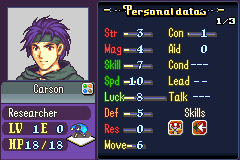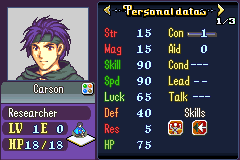Well, I think it does get the point across that at least this guy had a character arc that tied into his death, while Rodrigue could have slipped on a wet rock and broke his neck to get pretty much the same result. I guess a more obvious example would be the very obscure game Final Fantasy VII and its rather unknown development which, to avoid spoilers, I will simply call “Aerith gets murdered”. Another example that predates FF7 and could work better would’ve been
SPOILERS
Phantasy Star IV
But, in my opinion, even then “Aerith gets murdered” is an unfair comparison to “Rodrigue slips and falls and dies” if only for the fact that one of them concerns a playable character, whom the player will necessarily have grown at least accustomed to, if not fond of, while the other concerns an NPC.
If you ask me if there’s a game I’m heavily biased toward, I would answer Tales of Berseria. If you ask me if there’s a game that uses an NPC’s death well enough to be impactful to the player, let character development and plot progress, while not feeling like “oh so that’s when it happens”, my answer would also be Tales of Berseria. So, before we move on, spoilers for Tales of Berseria’s first hour or two incoming. Skip if you want to experience it yourself (which you should btw). The basic premise of the game is that you play as a revenge-obsessed highschool quiet kid’s OC who’s like really angry 95% of the time. The game’s prologue however takes place 3 years prior, and we see said character as a happy and cute village girl, taking care of her little brother Laphicet who’s suffering from some sickness preventing him from leaving his bed for too long; and exchanging vaguely meaningful conversations with her mentor figure Arthur. What sets her character off her peaceful life and forces her to be the completely different person she is for the rest of the game is Laphicet’s death at the hand of Arthur on the 7th anniversary of her older sister’s death. I find this interesting because, on paper, it’s the death of an NPC we’ve known for like just an hour or two caused by another NPC we’ve known for an hour or two, and yet, this death is impactful not only to the protagonist, but also us the player. I cannot speak for everyone, but this was a major shocker for me.
But this doesn’t apply only to video game characters too. I find it interesting that the two most well-known moments of Fullmetal Alchemist are the deaths of characters that honestly fill the purpose of NPCs. (Again, spoiler warning, don’t read the following paragraph if you want to experience Fullmetal Alchemist, in particular Brotherhood, by yourself) Well, this spoiler warning is mostly useless, since I’m pretty sure anyone who hasn’t lived in a cave these last 10 years will known what I’m talking about : The deaths early on (Both during season one of Brotherhood) of Nina Tucker and Maes Hughes. Both actually fill roles that are commonly so associated with death flags they might as well start out dead, and yet both deaths have been equally impactful not only to the fanbase but to pop-culture as a whole, moreso than any future death involving characters we’ve seen for a much longer time, even though Nina is essentially just an NPC girl made to make you care, and Hughes filling the same role as Rodrigue, being some sort of vaguely-mentor-ish figure.
So, what makes these work and not our boy Rodrigue? Well, to be honest, I don’t think there is any simple answer to that. But, in my personal opinion, I think the most important thing is the long-term consequences. All of the deaths I’ve cited earlier have consequences that are immediately felt, as well as other consequences long after that. In a way, one has to think of the butterfly effect. If one wing flap of a butterfly can cause a tornado at the other end of the world, what may a person’s death cause? To be fair, it’s been a while since I’ve played Blue Lions so I may be misremembering, but I think Rodrigue’s death has no consequences besides Dimitri feeling very sad at first, and then realizing vengeance isn’t cool. Past that point, bar some mentions (which could be resumed as “in the end it’s kinda great rodrigue died”), I’ve felt like Rodrigue’s death could just not have happened and Dimitri’s character development could’ve stayed the same, by getting himself nearly killed for example.
To go back to the Fullmetal Alchemist example, I think this also why the two early deaths have stuck so much more with fans than any other later, equally heart-breaking deaths. Those, while well-executed, lacked the consequences Nina’s and Hughes’ had.
I’m not saying a character should angst around 100% of the time following another character’s death, there’s a balance of course, but I feel the main problem in 3H’s execution is that it lacks consequences, probably due to its formula? I feel like Dimitri reaching the conclusion that becoming feral because “haha revenge time” is not such a good idea could’ve been achieved without Rodrigue’s death, in fact, I’d argue it feels even less natural this way. A character obsessed with avenging the dead will not stop to think about their ways if someone close to them dies, quite the contrary.
Anyways that’s the end of today’s rant lol. As a side note, I feel I should mention 3H at least does something right : Rodrigue’s death has a purpose, at least. Too many medias, especially long-running series, try to kill off characters for no other reason than “subverting expectations”, “keeping viewership high” or for real-life reason like the actor simply not wanting to play the character anymore. And that’s far, far worse than Rodrigue’s case.
EDIT : Another factor that makes Aerith’s, Laphicet’s, Nina’s and Hughes’ deaths work and not Rodrigue’s are also how attached we grow to the characters. I’ll be honest, I don’t remember a single character trait of Rodrigue, while all of these had at least something going for them. But I kinda feel like that’s really a major fuck-up on 3H’s end and thus not really worth debating as much as funny consequences
 but it does slot into that “making the player character more static” thing very heavily – since Harry will always be who he is, and you’re only inhabiting a particularly pivotal week in his life, the dialogue feels much more like you’re trying to steer him in a particular direction rather than truly controlling him. Really really fascinating game.
but it does slot into that “making the player character more static” thing very heavily – since Harry will always be who he is, and you’re only inhabiting a particularly pivotal week in his life, the dialogue feels much more like you’re trying to steer him in a particular direction rather than truly controlling him. Really really fascinating game.

